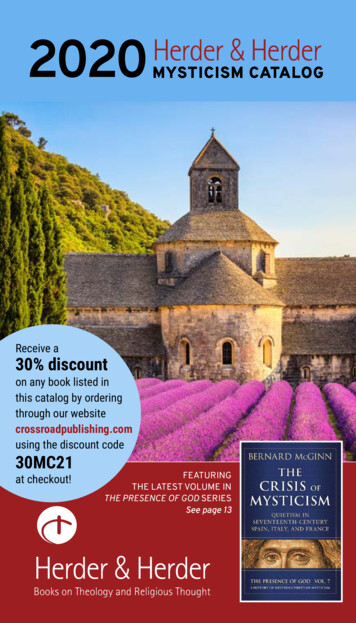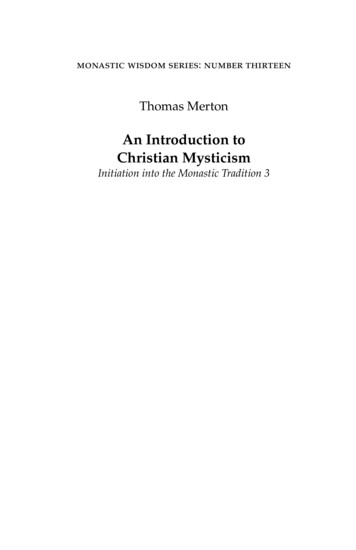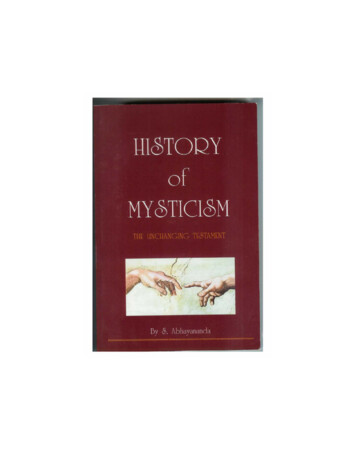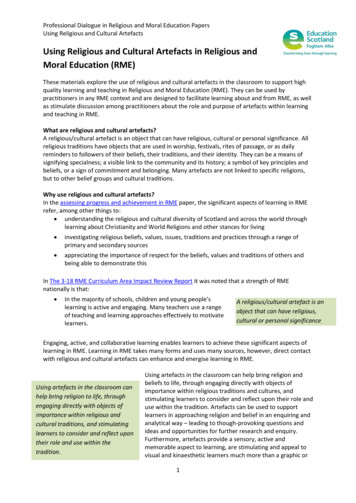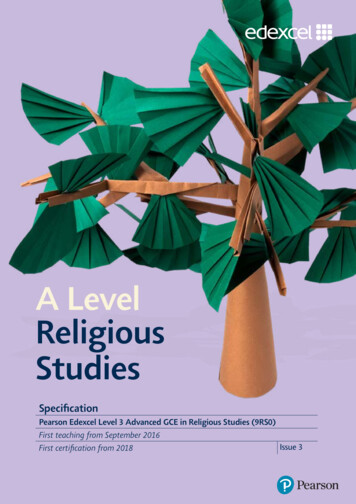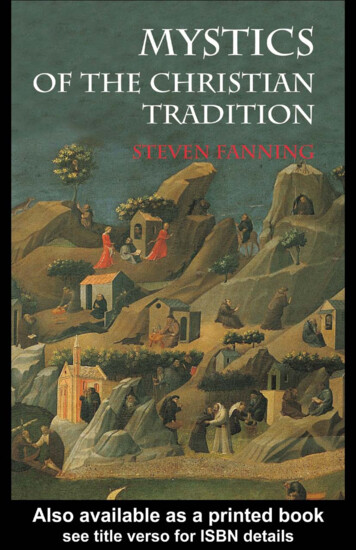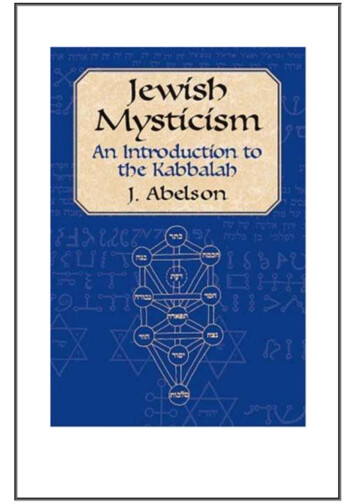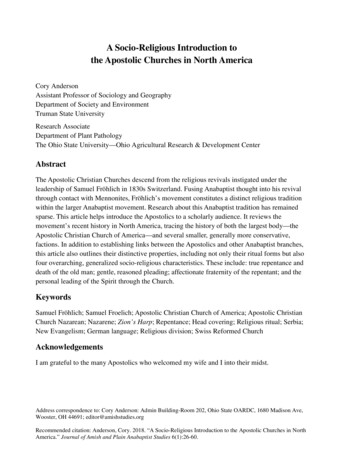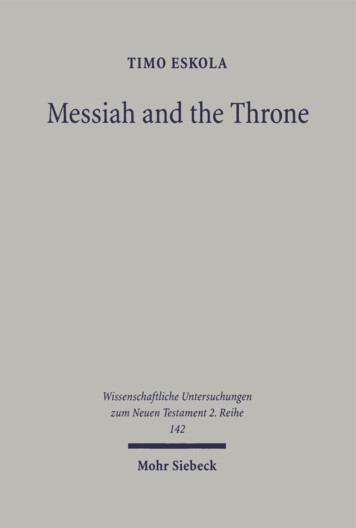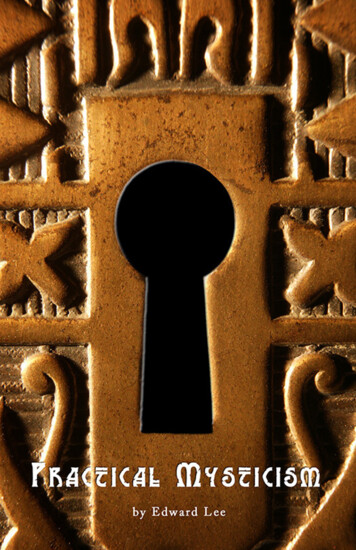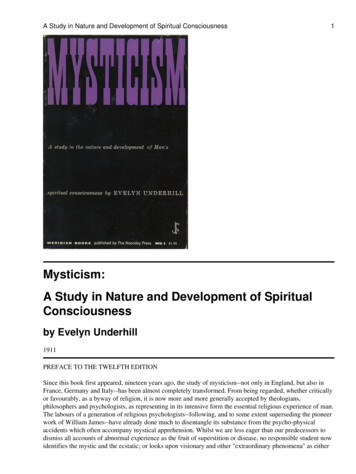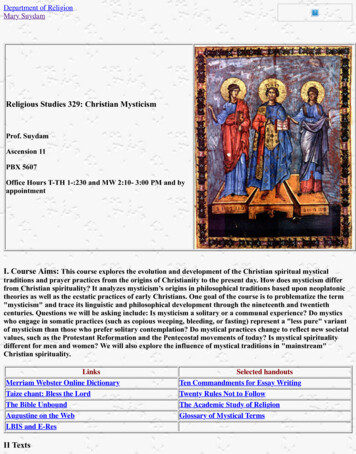
Transcription
Department of ReligionMary SuydamReligious Studies 329: Christian MysticismProf. SuydamAscension 11PBX 5607Office Hours T-TH 1-:230 and MW 2:10- 3:00 PM and byappointmentI. Course Aims: This course explores the evolution and development of the Christian spiritual mysticaltraditions and prayer practices from the origins of Christianity to the present day. How does mysticism differfrom Christian spirituality? It analyzes mysticism’s origins in philosophical traditions based upon neoplatonictheories as well as the ecstatic practices of early Christians. One goal of the course is to problematize the term"mysticism" and trace its linguistic and philosophical development through the nineteenth and twentiethcenturies. Questions we will be asking include: Is mysticism a solitary or a communal experience? Do mysticswho engage in somatic practices (such as copious weeping, bleeding, or fasting) represent a "less pure" variantof mysticism than those who prefer solitary contemplation? Do mystical practices change to reflect new societalvalues, such as the Protestant Reformation and the Pentecostal movements of today? Is mystical spiritualitydifferent for men and women? We will also explore the influence of mystical traditions in "mainstream"Christian spirituality.LinksMerriam Webster Online DictionaryTaize chant: Bless the LordThe Bible UnboundAugustine on the WebLBIS and E-ResII TextsSelected handoutsTen Commandments for Essay WritingTwenty Rules Not to FollowThe Academic Study of ReligionGlossary of Mystical Terms
Required:Jantzen, Grace. Power, Gender, and Christian Mysticism. Cambridge University Press: 1995Julian of Norwich: Showings . Paulist Press: 1978Chadwick, Henry, trans., St. Augustine: Confessions. Oxford World Classics: 2008Zum Brunn, E., and Épiney-Burgard, G., Women Mystics in Europe. Paragon House: 1988--Other texts as noted on E-Res and Web LinksRecommended: full text available on Course Reserve and excerpts available on E-Res:Bernard of Clairvaux: Selected Writings (trans. By G.R. Evans). Paulist Press: 1987The Cloud of Unknowing and Other Works. Penguin: 1978The Shakers, ed. Robley Whitson (Paulist Press, 1983)Jacob Boehme, The Way to Christ , translated by Peter Erb (Paulist Press, 1978)Pietists: Selected Writings , edited by Peter Erb (Paulist Press, 1983)Happold, F.C., Mysticism: A Study and an AnthologyMeister Eckhart, The Essential Sermons, trans. Edmund Colledge and Bernard McGinnOrigen: An Exhortation to Martyrdom, etc., trans. Rowan GreerIII Course RequirementsDiscussions and weekly meditation papers: 25%Because critical reading of the primary texts is so important, there will be weekly writingassignments of about 2 typed pages based upon the reading for that week. In the Christian mysticaltradition (stemming from monastic practice), reading is viewed as a meditative activity that leads todeeper understanding. These papers will serve as the basis for discussions. Active participation indiscussions is a critical component of this class. That being said, you should not come to class if youare sick, especially if you are coughing or sneezing. In that case please email your weekly paperalong with questions and comments you would ask in the discussion. Weekly papers cannot beturned in late.Midterm and Final exam: 20% and 30%Midterm and final exam questions will be given in advance. Both exams will be take-home and willbe due as noted in the syllabus. Both exams must be typed and double-spaced.Term paper: 25%
The term paper is an opportunity for you to pursue a topic in greater detail than class time allows. Itwill give you the chance to read, analyze, and write clearly about a particular mystic or topic thatinterests you. Each student is expected to choose a particular aspect of Christian mysticism that theywould like to learn more about. You are not expected to do outside research, but to read and analyzemore of a particular mystic's writings in greater depth than class time allows. Topics are due March22 (10 points). The preliminary draft is due April 17 (40 points). Final draft is due April 26 (50points). All deadlines are final.IV TopicsPART I: ORIGINSWeek 1: January 14 and 16: Introduction: What ismysticism? Ways of KnowingExample: Hildegard of Bingen, Meister EckhartHandout: The Roman Empire, 1- 300 C.E.Definitions of MysticismReading: Happold, Mysticism, introduction (E-Res), pages 1834January 18: Judaism, mystery religions, Christianity; Waysof KnowingsReading: Jantzen, Power, Gender, and Christian Mysticism,pages 1-18Platonic PhilosophyPlato's CosmologyWeek 2: January 21 nd 23: Greek Intellectual Thought: Plato and PlotinusReading: Plotinus excerpts:Fourth Ennead, Tractate 1: On the Essence of the SoulFifth Ennead, Second Tractate: the Origin and Order of the BeingsFifth Ennead, Fifth Tractate: On the Nature of the GoodSecond Ennead, Fourth Tractate: Matter : Through #10Sixth Ennead, Fourth Tractate: On the Integral Omnipresence of the Authentic Existent : through fifthtractate, #5Jantzen, Power, Gender, and Christian Mysticism, pages 26-58January 25 : OrigenReading: Origen, Introduction to The Song of Songs (E-Res)Jantzen, Power, Gender, and Christian Mysticism, 59-85Second Century: Christians in ConflictOrigen and the Mystical Tradition
Origen's Three-Fold PathWeek 3: January 28 and 30: Gnosticism and Roman ChristianityReading: "Hymn of the Robe of Glory": poem version, prose versionJantzen, Power, Gender, and Christian Mysticism, 85-95Valentinian's Cosmic SchemeGnostic GlossaryFeatures of the Proto-Orthodox ChurchesFebruary 1 : Orthodoxy takes shape: Constantine and monasticism; AugustineReading: Chadwick, The Confessions of St. Augustine, book 1Rome Becomes ChristianWeek 4: February 4,6,8: Augustine and the Pseudo-Dionysius AugustineReading: Pusey, The Confessions of St. Augustine, books 7-10, 12Augustine: Major IdeasThe Pseudo-DionysiusReadings: Pseudo-Dionysius, The Mystical TheologyThe Heavenly Hierarchy, chapter 1The Ecclesiastical HierarchyJantzen, Power, Gender, and Christian Mysticism, 95-109PART II: MEDIEVAL MYSTICISM: MYSTICISM OF THE HEARTWeek 5: February 11,13, 15: Twelfth-Century StabilizationFeb. 11 and 13 : The Twelfth Century Stabilization; Hildegard of Bingen and Bernard of ClairvauxReading: Women Mystics, "Hildegard of Bingen"Jantzen, Power, Gender, and Christian Mysticism,157-188Bernard of Clairvaux, On Loving GodFebruary 15 : Bernard of Clairvaux and Beatrice of NazarethReading: Bernard of Clairvaux, On Loving God, and Sermons (P/Class)Reading: Jantzen, Power, Gender, and Christian Mysticism, 123-133Reading: Women Mystics, "Beatrice of Nazareth"Class insights about HildegardWeek 6: February 18,20, 22: New Kinds of Piety
St. Bernard's Apology for the Failure of the Second CrusadeFeb. 18 : Waldensians, Cathari, FranciscansHeresyExcerpts from St. FrancisFeb. 20 : Hadewijch of Antwerp and the BeguinesReading: Women Mystics, "Hadewijch of Antwerp"Queen ReasonA Hadewijch GlossaryFeb. 22: Marguerite PoreteReading: Women Mystics, "Marguerite Porete"MIDTERM HANDED OUT IN CLASS PART III:MEDIEVAL MYSTICISM: INTERIOR MYSTICISMSWeek 7: Feb. 25, 27, March 1: Meister EckhartFeb. 25 and 27 : Meister EckhartReading: Meister Eckhart, selections (E-Res)March 1: Eckhart, Hadewijch, and PoreteCommon Vocabulary in Eckhart, Hadewijch and BeatrijsMidterm due March 1-------------------------------SPRING BREAK--------------------------------Week 8: March 18, 20, 22: English mysticsMarch 18: the Cloud of UnknowingThe Language of IneffabilityMarch 20 and 22: Julian of NorwichReading: Julian, Revelations of Divine LovePAPER TOPICS DUE IN CLASS.PART IV: MYSTICISM AND THE PROTESTANT REFORMATIONWeek 9: March 25, 27, 29: The Protestant ReformationMarch 25 , 27, 29: Anabaptists and PietistsReading: Jantzen, chapter 8 and 146-159
Early Anabaptist Spirituality (E-Res): Hans Hut, Essence of True Baptism, 77-81; Leonard Schiemer,Three Kinds of Grace, 83-97; Peter Walpot, True Yieldedness, 167-171The Pietists: Selected Writings (E-Res)August Francke, Foretaste of Eternal Life, 149-158; ThePietists: Selected Writings (E-Res)August Francke, Foretaste of Eternal Life, 149-158; Philip Spener,Pia Desideria, 31-37; Gottfried Arnold, Mystery of the Divine Sophia, 219-226; Count vonZinzendorf, Thoughts for the Learned, 291-295, and Concerning Saving Faith, 304-324Week 10: April 1, 3, 5: Teresa of Avila; Greek Orthodox MysticismThe Interior CastleChapters: The First Mansion, chapter 11; The Second MansionMansion; The Seventh Mansion, chapters 1-3The Life of St. Theresa Chapters 9, 18 and20The Way of Perfection: Explains the Meaning of Mental Prayer Through Continues the same subject.Explains the Prayer of Quiet.Week 11: April 8, 10, 12: Jacob BoehmeReadingsReadings: Jacob Boehme, The Way to Christ (E-Res): A Little Prayer, 56-62; The Fifth Treatise, 163170; The Seventh Treatise, 194-226Jacob Boehme, The Way to Christ:Book 3, "Of Regeneration", chapters 2, 3 and 4Book 4, "Of theSupersensual Life", Dialogues 1 and 2Week 12: April 15, 17, 19: New kinds of spirituality, 18th and 19th centuries: Shakers, Quakers, andPentecostalistsPRELIMINARY PAPER DRAFT DUE APRIL 15 IN CLASS.Readings: "Let Your Words Be Few" (E-Res)George Fox, AutobiographyThe Shakers (E-Res)About the ShakersBelton ChurchSpeaking in TonguesDrunk in the SpiritEthiopian Praise ServiceHealed in the SpiritSlain in the SpiritWeek 13: April 22,24, 26: Pentecostalism continued and Christian Nature MysticismApril 22: Film: Raise the DeadPAPER DUE APRIL 26 in class.April 22, 24: Christian Nature Mysticism
About Richard JefferiesRichard Jefferies, The Story of My HeartThomas Traherne, Centuries of MeditationBRING READINGS/VIDEO/WEBSITES FOR NEXT WEEK.Week 14: April 29, May 1 and 3 : Re-Thinking Mystic Ways TodayReading: Jantzen, chapter 9MamaMama Lola (E-Res)the Taize CommunityFINAL EXAM QUESTIONS WILL BE HANDED OUT MAY 3.FINAL EXAM IS DUE TUESDAY, MAY 7 BY 9 A.M. HAND IN AT MY OFFICE (ASCENSION 11).
PART II: MEDIEVAL MYSTICISM: MYSTICISM OF THE HEART Week 5: February 11,13, 15: Twelfth-Century Stabilization Feb. 11 and 13 : The Twelfth Century Stabilization; Hildegard of Bingen and Bernard of Clairvaux Reading: Women Mystics, "Hildegard of Bingen"Jantzen, Power, Gender, and Christian Mysti
